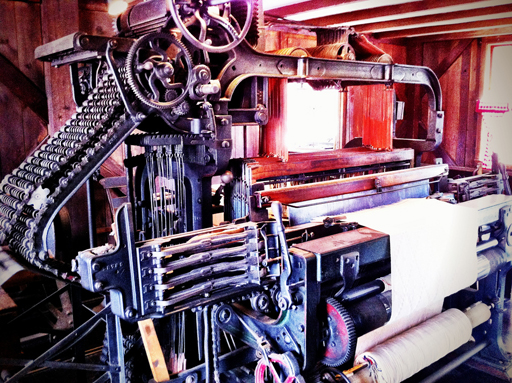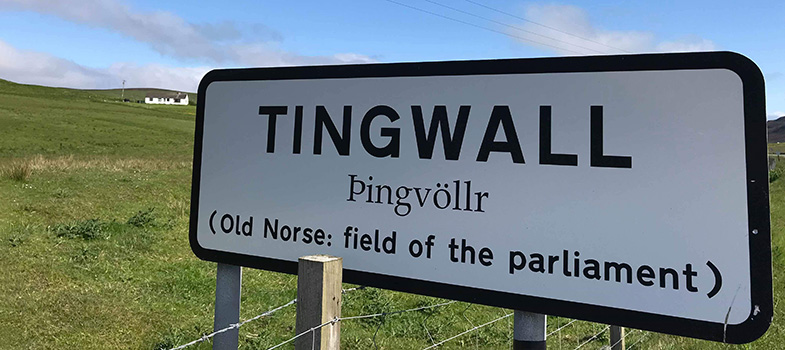7.5 Weavers
In this section you will take a closer look at weaving and the weaving industry in Scotland.
Activity 8
To start with, you will learn some Scots words which are specific to the weaving industry. When you look up these words in the DSL, you will not always find them or a direct translation. In some cases you would need to work with the example sentences to understand how they are used in the weaving context.
Use the DSL, or the example sentence from the DSL, to derive a translation into English of these weaving terms.
a.Shifter [Tip: hold Ctrl and click a link to open it in a new tab. (Hide tip)]
Per. 2000 Betty Stewart in Ian Macdougall's Voices from Work and Home 388:
When ah began in the mill ah wis a shifter, and that wis takin’ the bobbins off the machines before they were automatic.
- b.Bobbin
- c.Pass
- d.Spinnin
- e.Warp
- f.Weft
Answer
- a.Shifter - a person who takes the full spools of thread off the spinning frames and replaces them with empty ones
- b.Bobbin – A spool (of or for thread)
- c.Pass – a passage between looms in a weaving shop
- d.Spinnin – spinning / to do with spinning thread
- e.Warp – to move to and fro, to zig-zag, to flurry or whirl about
- f.Weft – the woof or cross-threads of a web of cloth, to make a web

Weavers used the threads created by spinners to make a variety of fabrics and materials. Originally weavers worked from home - women and children worked in their own cottages - until the Industrial Revolution when big weaving sheds were set up with power looms. Weavers in Scotland produced: quality tweeds in the Borders, cottons in the west, damask in Dunfermline, patterned shawls in Paisley and jute in Dundee.
After a famous visit of George IV to Edinburgh in 1822, tartan was produced commercially as it enjoyed a big jump in demand. Spinners and weavers often fell out, as weavers thought they were superior. The Weaving Industry was one where workers recited many songs, including many which feature an abundance of Scots language.

The songs of the millworkers of Scotland are perhaps best embodied by Dundonian Mary Brooksbank's song, Oh Dear Me, also known as The Jute Mill Song.
“Of all the poems and songs that are associated with Mary Brooksbank, the ‘Jute Mill Song’ or ‘Oh Dear Me’ is probably the best known. Based on a single traditional verse which she adapted as the chorus, she managed to capture a lot more about life than just the hardships of the jute mill lassies. […] Mary Brooksbank worked all her working life in the jute mills of Dundee and the song tells of the hard life. Mary was a member of the communist party and a social activist. She self-published a book of her poems and an autobiography.
Shiftins, piecing and spinning were three of the jobs on the 'flett' (i.e. flat - the floor on which the spinning machinery stood). […] Ten and nine was the weekly wage of the mill lassies at the turn of the century - ten shillings (paid as a gold half sovereign) and nine pence.”
Activity 9 
Part 1
In order to develop a more accurate impression of life in Dundee and working in the mills at the time when Mary Brooksbank was composing her song, watch this video Jute Mill Chanters & Shifters.
Part 2
Now read the three verses of the Jute Mill song and try to understand the lyrics. As you have looked up the key words to do with weaving in the previous activity, you might even be able to understand the song without looking up words in the DSL.
Please note: piecing in this context means tying together threads on the machines.
Oh dear me, the mill’s gaen fast,
The puir wee shifters canna get their rest,
Shiftin bobbins, coorse and fine,
They fairly mak ye work for your ten and nine.
Oh dear me, I wish the day was done,
Rinnin up and doon the pass is nae fun.
Shiftin, piecin, spinnin, warp, weft and twine,
Tae feed and cleed my bairnies affen ten and nine.
Oh dear me, the world’s ill-divided
Them that work the hardest are the least provided,
But I maun bide contented, dark days or fine.
There’s no much pleasure living affen ten and nine.
Part 3
And finally, listen to Mary Brooksbank herself sing and describe how she composed the song in a recording provided on the website of the Kist o Riches project.
7.4 Scottish surnames and crafts
